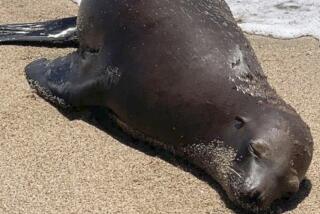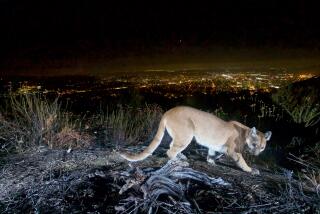Mountain lion captured in Simi Valley, but it’s not the one that ate a dog
- Share via
A mountain lion was captured in Simi Valley early Thursday, but officials say it is not the same cat that attacked two dogs — killing one — last week in the city.
Officials with the Simi Valley Police Department and the California Department of Fish and Wildlife responded to reports that a mountain lion was attacking a raccoon in the backyard of a home on Broadmoor Avenue shortly after 5 a.m., Cmdr. Steve Shorts said.
Authorities tranquilized the cat, which was not wearing a tracking collar, and bound its legs before putting it in the back of a truck. The animal will be collared and then released back to its native habitat, officials said. It was not immediately clear where the big cat would be taken, but the nearby Santa Monica and Santa Susana mountains are both home to mountain lions in a study group monitored by the National Park Service.
California Department of Fish and Wildlife officials could not immediately provide information about the animal, including its size or where they think it came from.
Shorts said it’s unusual for mountain lions to be frequenting the area with so much regularity, despite the city’s close proximity to the mountainous areas where the animals live.
“Living in this region, people frequently see evidence of cats in the area,” he said. “I can’t remember a time when we’ve had two come into separate neighborhoods in such a short period of time. I don’t know what’s going on over there.”
Last week, another big cat that officials suspected was P-35 — a 9-year-old female who is one of the few mountain lions studied in the Santa Susana Mountains — attacked two small dogs in another neighborhood about six miles away, on Evening Sky Road. Researchers lost track of P-35 about two years ago when her collar malfunctioned, and they have been unable to track her whereabouts since. P-35 is the mother of P-44, P-48 and P-49.
Food sources in residential neighborhoods attract mountain lions, so officials caution residents not to leave pet food out overnight, Fish and Wildlife spokesman Tim Daly said.
“The more food they find in neighborhoods, the more likely they are to return,” he said. “They know where the food is, and they’ll keep seeking it. When the supply is interrupted, they’ll hopefully stay in the places we want them to stay, which is out of neighborhoods.”
Times staff writer Alejandra Reyes-Velarde contributed to this report.
More to Read
Sign up for Essential California
The most important California stories and recommendations in your inbox every morning.
You may occasionally receive promotional content from the Los Angeles Times.











